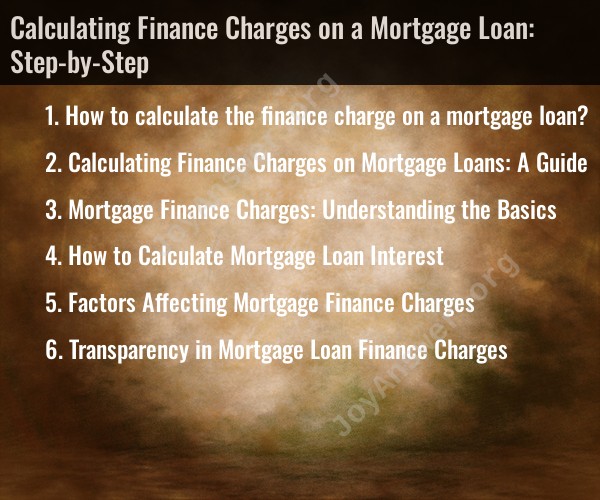How to calculate the finance charge on a mortgage loan?
Calculating the finance charge on a mortgage loan involves several factors, including the loan amount, interest rate, and the length of time for which the interest is being calculated. The finance charge represents the cost of borrowing and is typically composed of both the interest paid over the life of the loan and any other fees or charges associated with the mortgage. Here's a step-by-step guide to calculate the finance charge on a mortgage loan:
Step 1: Gather Loan InformationCollect the following details related to your mortgage loan:
- Principal Loan Amount: This is the initial amount you borrowed.
- Annual Interest Rate: The annual interest rate as a percentage.
- Loan Term: The total number of years over which the loan will be repaid.
- Payment Frequency: Determine whether your mortgage payments are monthly, bi-weekly, or otherwise.
Step 2: Convert the Annual Interest RateIf your mortgage uses an annual interest rate (most common), you'll need to convert it to a monthly rate if your payments are made monthly. To do this, divide the annual interest rate by 12 to get the monthly interest rate as a decimal.
Monthly Interest Rate = (Annual Interest Rate / 12) / 100
Step 3: Calculate the Number of PaymentsDetermine the total number of payments over the life of the loan based on the loan term and payment frequency. For example, if you have a 30-year loan with monthly payments, you'll make 30 years * 12 months = 360 payments.
Step 4: Calculate the Monthly PaymentUse the standard loan amortization formula to calculate the monthly payment:
Monthly Payment = P * (r * (1 + r)^n) / ((1 + r)^n - 1)
Where:
- P = Principal Loan Amount
- r = Monthly Interest Rate (as a decimal)
- n = Total Number of Payments
Step 5: Calculate Total PaymentsMultiply the monthly payment by the total number of payments to determine the total amount paid over the life of the loan (excluding any additional fees or charges):
Total Payments = Monthly Payment * Total Number of Payments
Step 6: Calculate the Finance ChargeTo calculate the finance charge, subtract the principal loan amount from the total payments:
Finance Charge = Total Payments - Principal Loan Amount
The finance charge represents the total interest paid over the life of the loan. It's important to note that this calculation doesn't include any other fees or charges that may be associated with the mortgage. To get a more accurate figure for the total cost of the loan, consider other costs, such as closing costs, points, and any other fees required by your lender.
Keep in mind that this calculation provides an estimate of the finance charge based on the information available at the start of the loan. For an exact finance charge calculation, it's advisable to consult your lender or review your mortgage statement.
Calculating Finance Charges on Mortgage Loans: A Guide
The finance charge on a mortgage loan is the total amount of interest and other loan charges that you will pay over the life of the loan. It is important to understand how to calculate the finance charge on your mortgage loan so that you can compare different loan offers and choose the one that is best for you.
To calculate the finance charge on your mortgage loan, you will need to know the following information:
- The loan amount
- The interest rate
- The loan term
You can use the following formula to calculate the finance charge on your mortgage loan:
Finance charge = Loan amount * Interest rate * Loan term
For example, if you have a $300,000 mortgage loan with an interest rate of 5% and a loan term of 30 years, your finance charge would be:
Finance charge = $300,000 * 0.05 * 30 = $450,000
This means that you would pay a total of $450,000 in interest and other loan charges over the life of your loan.
Mortgage Finance Charges: Understanding the Basics
In addition to interest, there are a number of other loan charges that can be included in the finance charge on a mortgage loan. These charges may include:
- Origination fee
- Discount points
- Appraisal fee
- Credit report fee
- Title insurance
- Recording fee
- Mortgage insurance premium
It is important to note that some of these charges may be optional, while others may be required by the lender. Be sure to ask your lender about all of the potential charges associated with your loan so that you can budget for them accordingly.
How to Calculate Mortgage Loan Interest
The interest rate on your mortgage loan is the percentage of the loan amount that you will pay in interest each year. The interest rate is one of the most important factors that will affect the finance charge on your mortgage loan.
To calculate the interest on your mortgage loan, you can use the following formula:
Interest = Loan amount * Interest rate * Time
For example, if you have a $300,000 mortgage loan with an interest rate of 5% and a loan term of 30 years, you would pay $15,000 in interest each year.
Factors Affecting Mortgage Finance Charges
There are a number of factors that can affect the finance charge on your mortgage loan, including:
- Loan amount: The higher the loan amount, the higher the finance charge will be.
- Interest rate: The higher the interest rate, the higher the finance charge will be.
- Loan term: The longer the loan term, the higher the finance charge will be.
- Loan charges: The more loan charges that are included in the loan, the higher the finance charge will be.
Transparency in Mortgage Loan Finance Charges
The federal government has enacted a number of laws and regulations to ensure transparency in mortgage loan finance charges. These laws and regulations require lenders to disclose all of the potential costs associated with a mortgage loan before the borrower agrees to the loan.
The most important disclosure that borrowers need to be aware of is the Closing Disclosure. The Closing Disclosure is a form that provides borrowers with a detailed breakdown of all of the costs associated with their mortgage loan, including the finance charge.
Borrowers should carefully review their Closing Disclosure before signing any loan documents. If you have any questions about the finance charge or any of the other costs associated with your mortgage loan, be sure to ask your lender.
Conclusion
Understanding how to calculate the finance charge on your mortgage loan is essential for making informed decisions about your mortgage. By carefully considering the factors that affect the finance charge, you can choose a loan that is best for your financial needs.













